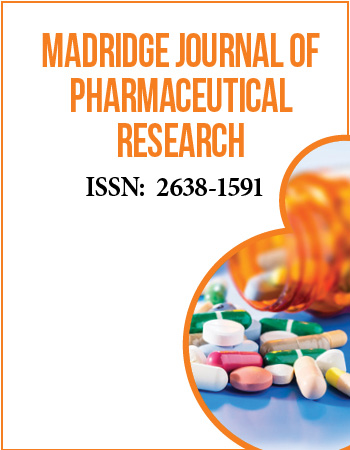International Conference on Medicinal and Pharmaceutical Chemistry
December 5-7, 2016 | Dubai, UAE
Cardiovascular effect of Nigella sativa L. aqueous extract in normal rats
Moulay Ismail University, Morocco
The present wok aims to evaluate the cardiovascular effect of Nigella sativa L. aqueous extract (NSAE) in normal rats. The in vivo experiment showed that the intravenous injection of NSAE at the doses of 50, 100 and 200 mg/kg of body weight produced a dose dependent reduction in the mean arterial blood pressure (MABP) (p<0.001) accompanied by a significant fall in heart rate (p<0.01). In the in vitro experiment, NSAE was tested at the doses of 10, 20 and 30 mg/ml. Addition of NSAE to the plateau contraction induced by Norepinephrine (NE) produced a dose dependent reduction in the arterial tone (p<0.01). Furthermore, incubation of NSAE during 30 min caused a right shift of the contraction response curve of aortic ring to NE with a reduction of the maximal contraction response (p<0.01). Endothelium destruction significantly reduced the vasorelaxant effect of NSAE at a dose of 30 mg/ml (p<0.01). Furthermore, Nitric oxide synthase inhibitor: Nw-Nitro-L-Argenine Methyl (L-NAME) produced a significant reduction (p<0.01) of the in vitro vasorelaxant effect of NSAE at a dose of 30 mg/ml.
We conclude that NSAE possess a rapid and dose dependent in vivo hypotensive effect in normal rats which may be probably due to the inhibition of parasympathetic tone. In isolated aortic ring, NSAE possess a potent inhibitor of contractile response to NE which may be probably due to an increase in the endothelial nitric oxide synthesis.
This work was supported by the CNRST under grant N° PPR/2015/35.
Biography:
Mohamed Eddouks is Professor at Moulay Ismail University, Faculty of Sciences and Techniques Errachidia, Morocco. He is a researcher in Physiology and Pharmacology with a Master Degree in Metabolic and Molecular Endocrinology from University of Paris vi, a specialized certificate in Endocrine Pharmacology from University of Paris vii and PhD degrees in Physiology and Pharmacology from University of Liege, Belgium and Sidi Mohammed Ben Abdellah University, Fez, Morocco. After his post-doctoral fellowship at Department of Physiology, Faculty of Medicine of Montreal, Canada, he is working for the last 16 years on medicinal plants. His work on antidiabetic and antihypertensive plants is well recognized globally. His research focuses on ethno biological as well as pharmacological issues in the use of Moroccan medicinal plants for the treatment of diabetes mellitus, obesity and hypertension. His contribution to this field includes four international books and more than 80 peer-reviewed articles and book chapters of international repute. He is Guest Editor of American Journal of Pharmacology and Toxicology, Lead Guest Editor of an annual special issue published by Evidence-Based and Complementary Alternative Medicine, Regional Editor of the Following journals: American Journal of Food Technology, Journal of Applied Sciences, Trends in Applied Sciences Research and Singapore Journal of Scientific research, Member of Editorial Board of several international journals. He has been honored with the first Prize of Scientific Research in 2008 by the Moroccan Association of Research and Development and the first Prize of the Federation of Arab Scientific Councils in 2016. He has been the Dean of Polydisciplinary Faculty of Errachidia from 2008 to 2012.


